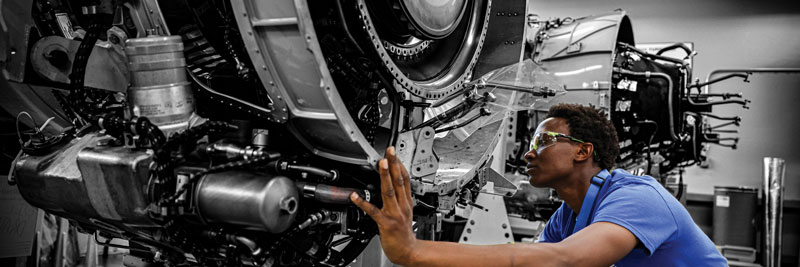
The holidays can be stressful, and Halloween is full of surprises, but your next aircraft engine maintenance event doesn’t have to be! With the right preparation and knowledge, you can avoid unexpected issues and ensure a smooth process from start to finish. Here’s what to expect before, during, and after an engine maintenance event—and how you can be fully prepared for every step.
1. Know What’s Coming Due and When
One of the first steps in planning aircraft engine maintenance is understanding what’s coming due and when. Not all tracking programs are accurate, and some may not monitor due times on the correct frequencies. Duncan Aviation can assist by fully reviewing engine logbooks to confirm the actual time remaining on your engine.
If your engine is under a program, approval from the program is required before any work can begin. This crucial step ensures no delays down the road.
2. Understand Engine Program Coverage and Liabilities
Understanding your engine program coverage is key. Contracts can vary widely, from basic large-event-only coverage to more comprehensive plans that include technician travel and engine shipping. If your engine is not under a program, you’ll need to explore other options. Knowing exactly what is covered—and what liabilities you may be responsible for—helps you avoid unexpected costs during the event.
The following are engine parts/warranty programs we support. We will file the claims on your behalf.
3. Choose the Right Vendor
The FAA attempts to standardize engine maintenance through regulations and requirements. However, in reality, maintenance events are not created equal, and there is nothing the same about maintenance facilities and the quality of work performed. Nothing.
Choosing the right MRO for your engine maintenance event can make all the difference. You have many choices, so do your research. Look for an MRO that offers early support and thorough preplanning to ensure parts are ordered and in stock before the engine input. Make sure the provider is authorized to perform the required work and will stand behind it once the engine is back in service.
Duncan Aviation Engine & APU Services
4. Consider Rental Engines
If your aircraft needs to stay in operation during the event, renting an engine could be an option. However, this comes with its own set of challenges. A Bailment Agreement must be signed between you and the engine provider, and you’ll need to meet insurance requirements for the engine. Aircraft Hull insurance must also be amended to include the rental engine. Program coverage costs will also apply as if it were your own engine, and additional fees for shipping and daily or monthly rental rates can add up quickly. Pay close attention to the dates on your insurance documents. You may incur additional daily fees for expired documentation. Be sure to read the fine print to avoid surprises.
Timing is crucial with rental engines. There may be specific deadlines for shipping the rental to the servicing facility and returning the original engine. Coordinating shipping, labor, and aircraft availability can be tricky, and failing to meet these deadlines could result in additional fees. Again, read the fine print.
5. Coordinate Airframe Maintenance
To minimize aircraft downtime, it’s ideal to coordinate engine and airframe maintenance events. Remember that engine programs can be strict about the timing of coverage. If your engine hasn’t reached the due time, the program may not approve the event, or they may require you to buy up the remaining due hours. Some engines can be flown into an approved overrun, allowing you to align the engine event with an upcoming airframe event.
6. Know What Happens After the Event
Before the event begins, ask detailed questions about what happens once it’s over. Understand the warranty coverage, who will provide support, and how the process works. Being informed ahead of time will prevent confusion and ensure you’re not left in the dark after the event.
Duncan Aviation Rapid Response Teams
By taking these steps and partnering with the right experts, you can ensure that your next engine maintenance event runs smoothly and without unexpected scares.
Duncan Aviation broke ground on a new 36,000-square-foot Pratt & Whitney Canada Designated Overhaul Facility in Lincoln, Nebraska. Set to open in 2026, this facility will enhance Duncan Aviation’s engine service capabilities, supporting the PW300 and PW500 series engines and expanding MRO services company-wide.
For a complete list of engine capabilities, download the Duncan Aviation Engine Fact Sheet.
Contact your Duncan Aviation Engine Service Sales Representative to schedule your aircraft engine maintenance.
February 2026
February 2026
February 2026
February 2026
February 2026